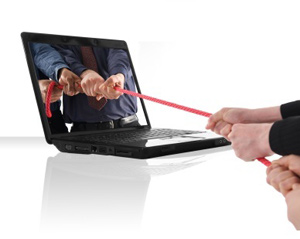
Last week's Wikipedia-led blackout in protest of U.S. copyright legislation called the Stop Online Piracy Act (SOPA) is being hailed by some as the Internet Spring, the day that millions fought back against restrictive legislative proposals that posed a serious threat to an open Internet.
Derided by critics as a gimmick, it is hard to see how the SOPA protest can be fairly characterized as anything other than a stunning success. Wikipedia reports that 162 million people viewed its blackout page during the 24-hour protest period. By comparison, the most-watched television program of 2011, the Super Bowl, attracted 111 million viewers.
More impressive were the number of people who took action. Eight million Wikipedia visitors looked up contact information for their elected representatives, 7 million people signed a Google petition, and Engine Advocacy reported that it was completing 2,000 phone calls per second to local members of Congress.
The protest launched a political earthquake as previously supportive politicians raced for the exits. According to ProPublica, the day before the protest, 80 members of Congress supported the legislation and 31 opposed. Two days later, there were only 63 supporters and 122 opposed.
Latest in net freedom fighting
The SOPA protest ranks as the largest online action to date, but it was foreshadowed by similar developments around the world. In 2007, tens of thousands of Canadians used Facebook to register their concern with impending copyright legislation (I launched one of the main groups involved). In response, the government delayed introducing the legislation by six months, during which it added several provisions aimed at pacifying the public criticism.
In 2009, thousands of people in New Zealand launched their own blackout campaign against proposed "three strikes and you're out" copyright legislation that would have led to Internet users losing access based on three allegations of infringement. Users blacked out websites and profiles on Facebook and Twitter. The New Zealand government responded by withdrawing the legislation.
The similarities between the SOPA protest and digital activism in other countries does not end there. In virtually all cases, opponents dismiss protesters as pirates or pawns (or in the case of Canadian Heritage Minister James Moore, "radical extremists") who lack a genuine understanding of the issues.
Celebs, lobbyists fight back
Yet the Motion Picture Association of America is happy to trot out well-known movie stars with little copyright law familiarity since they are guaranteed to garner attention. Moreover, during earlier SOPA hearings, several politicians seemed to take pride in their lack of technical knowledge and experience.
The MPAA called the protests "an abuse of power" by platforms that serve as gateways to information, a particularly rich claim coming from a group that once threatened to delay screening movies in Canada unless it passed new copyright rules, and still requires its customers to sit through unskippable anti-piracy messages at the beginning of movies on DVDs or at the theatre.
Most troubling were lobbyists who lamented the politicians' shifting policy positions due to the popular protest, as if their own preferred approach of spending millions on campaign contributions is somehow a more democratic method of lawmaking.
It may be tempting for SOPA protesters to declare victory, but history teaches that political wins are rarely absolute. The current Canadian legislation, Bill C-11, is much more balanced than the 2007 proposal, but the digital lock provisions that sparked the initial protest remain largely unchanged. In New Zealand, the government later introduced a more balanced bill with greater safeguards, but the prospect of terminating Internet access was not completely eliminated.
SOPA appears to be headed for the dustbin, but successor U.S. legislation is sure to follow. A political consensus on anti-piracy legislation will eventually emerge, but the day the Internet fought back will remain the elephant in the room for years to come. ![]()
Read more: Rights + Justice, Politics, Science + Tech
















Tyee Commenting Guidelines
Comments that violate guidelines risk being deleted, and violations may result in a temporary or permanent user ban. Maintain the spirit of good conversation to stay in the discussion.
*Please note The Tyee is not a forum for spreading misinformation about COVID-19, denying its existence or minimizing its risk to public health.
Do:
Do not: